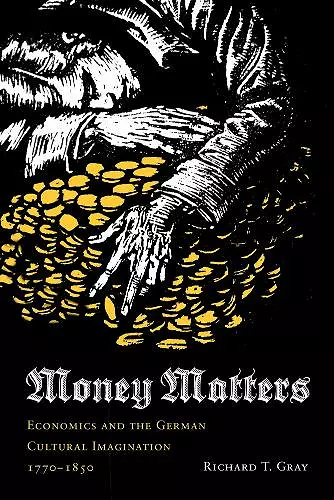Money Matters
Economics and the German Cultural Imagination, 1770-1850
Format:Paperback
Publisher:University of Washington Press
Published:12th Nov '08
Currently unavailable, and unfortunately no date known when it will be back
This paperback is available in another edition too:
- Hardback£95.00(9780295988368)

Money Matters is both a manifesto for what Gray terms the 'New Economic Criticism' and a model of how it should be done. He argues against the notion that culture and economics have nothing to do with one another, insisting instead that German aesthetic theory and artistic practice are deeply implicated in a parallel discourse about the meaning of money at a time of sweeping political, cultural, and economic change. Money Matters is a landmark study that belongs to the very best work in German studies today. -- Todd Kontje, author of German Orientalisms
Investigates the discourses of aesthetics and philosophy alongside economic thought, arguing that their domains are not mutually exclusive. This book documents the extent to which economics influenced literature and philosophy and the surprising degree to which literature and philosophy participated in the creation of modern economic paradigms.
In Money Matters, Richard Gray investigates the discourses of aesthetics and philosophy alongside economic thought, arguing that their domains are not mutually exclusive. The transition in Germany from an agrarian or proto-industrial economy to a capitalist industrial economy, which was paralleled by a shift from the exchange of money in coin to the use of paper currencies, occurred simultaneously with an efflorescence of German-language literature and philosophy. Based on close readings of canonical literary and philosophical texts, Gray explores how this confluence led to a rich cross-fertilization between economic and literary thought in Germany during this period.
Money Matters documents the surprising degree to which literature and philosophy participated in the creation of modern economic paradigms, as well as the extent to which economics influenced literature and philosophy. The cultural artifacts of the period demonstrate the existence of an “economic unconsciousness”: persistent notions of value and exchange that inflect the aesthetic and thematic dimensions of literary and philosophical texts. This book offers a thought-provoking and original analysis of literature and ideas in the critical transition period from Kant and Goethe, through the German Romantics, to Marx.
"Gray's book Money Matters is the work of a voracious and yet rigorously disciplined intellect, and points to the way to a sustained engagement of the humanities with three centuries of political economy. Unfortunately, books like Gray's . . . are all too rare. In an age where finance capital continues to make good use of liberal arts graduates . . . the liberal arts must continue to speak directly to the historic of economics, and attest to a cultural memory that can counterbalance the rush of amnesia between the screens of global monetary systems. In short, more people should read and think and write this way—and therefore, more people should read what Richard Gray offers in this volume."
* Monatshefte *"Among many other things, this is a timely book. As the global financial crisis has shattered the myth of a self-regulating market economy . . . Gray's study makes a point that threatens to get lost in the prevailing atmosphere of moral indignation: money does matter—even, and perhaps especially . . . in the lofty realms of what Germans like to call the 'breadless' arts, that is, in cultural imagination. . . . [There are] rich and manifold interactions between the literary and the monetary economies that Gray has explored in a fascinating book."
* Modern Language Quarterly *"In short, Money Matters is a book that matters. In concert with the likes of Beiser, Lenoir, and Richards, Gray does help to pen a different, but more accurate and far more comprehensive, picture of one of the most crucial phases of the history of German culture and European science and society. Gray does us the indispensable favour of providing not only an insightful and convincing book, but also one that is well-crafted and even fun to read…. I can say that Money Matters is one of those books that will remain on my desk among that small selection of well-worn books that I always keep in reach and use very frequently. I have never given higher praise to a book, and it is not likely that I ever will again."
* Canadian Journal of History *"Gray's approach, combining meticulous and penetrating case studies with broader theoretical and historical considerations… is again utilized to great advantage, elegantly melded with Gray's expansive learnedness in philosophy and cultural and literary theories."
* German Quarterly *"…in Money Matters Richard T. Gray uncovers significant episodes of a productive interplay between economics and culture that, at least in the case of Germany, constituted a foundational moment in the history of both…. Gray's discovery of such enthusiasm for modern economics on the part of characters who have been consistently vilified as antimodernists is supremely illuminating, worthy of further study-representing intellectual history at its best"
* Business History Review *"What makes Gray's writing so interesting is the fact that he reads the two social arenas, economics and literature, together, through each other, and posits as his central thesis that the move from a substantialist economy (i.e., an economy based on substances such as gold) to a functionalist economic system (i.e., one based on the exchange of promissory notes such as paper money) was mirrored in the period's literature. This approach yields interesting insights . . . . [and] informed by the writings of Marx, Freud, Bataille and Althusserl, elicits remarkable results and will no doubt add valuable insights to existing scholarship."
* Journal of Contemporary European Studies *"It is relevant and most instructive for us today that Gray demonstrates the close connection between economics and the imagination in the theory of paper money. Gray describes this connection on the examples of thinkers such as Hamann and Herder, Fichte and the Romantics Novalis or Adam Müller, and ultimately in the case of Goethe."
* Frankfurter AllgemeiISBN: 9780295988375
Dimensions: unknown
Weight: 680g
464 pages